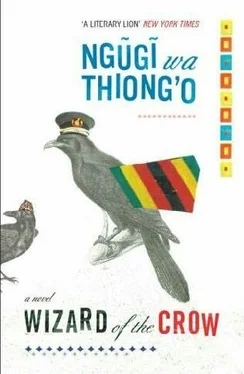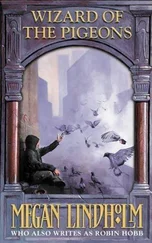“I wasn’t there, but I heard rumors about it,” he said.
“About Marching to Heaven? Or about the snakes?” But as soon as she had uttered the questions she looked at her watch and jumped to her feet. She did not notice Kamltl wince at the mention of the word snake. “It’s getting late. I must get going,” she said.
“Where do you live?” Kamltl asked.
Nyawlra paused, dwelling on the question and its answer.
“In Santalucia, two rooms and a kitchen. What about you?”
“Bahati,” he said and did not give details.
While they were clearly reluctant to talk more about themselves, they seemed as reluctant to leave each other’s company.
“I have to get home before dark,” Nyawlra said again. “Now that you know my place of work, if you ever find yourself with time to spare, you can come over for lunch. I know many nice fish and chips places around here,” she said, and left.
Kamltl followed her with his eyes until her figure was lost in the massing crowd.
Her presence and their talk had taken him away from his troubles, but now they came back with a vengeful fury. He indulged in self-pity edged with self-contempt. Why did I lie to her about Bahati? I wish I had told her straight out that I did not have shelter for the night. I should have asked her to let me stay in her place tonight or asked her for dinner tonight instead of lunch in the future.
He rose and walked toward the city center. Many shops were now under lock and key. Elsewhere armed security guards reported for night watch. It was as if the city were at war. His parents used to tell him that in the olden days in the villages and the countryside, they never even bothered to lock their doors, pulling them shut only to prevent stray animals from entering. He jumped to one side to avoid colliding with two men who were pushing empty mkokoteni carts, racing toward Santamaria Market.
Soon he reached the market, where hand- and donkey-pulled carts were competing for customers and the right of way, as were a motley assortment of rickshaws pulled by bicycles, scooters, and mules. The scene reminded him of a street in Old Delhi where ox-pulled carriages competed for the right of way with cows, tricycles, decrepit motor vehicles, and of course the latest models. He thought, Why don’t I look for a cart and start bearing loads for a fee like all these others? But even a mkokoteni costs money. Besides, unlike picking through garbage or begging, this trade could not be done surreptitiously; it would be embarrassing for a Masters of Business Administration to be running about with a mkokoteni hand-pulled cart, shouting for customers.
Embarrassing? No, it would be humiliating…
The humiliation he had suffered on the premises of Eldares Modern Construction and Beal Estate came rushing back with such a force that for a few seconds he felt dizzy and had to still himself against the wall of the nearest building to keep from falling down. His heartbeats became drumbeats. His mind jumped from place to place, image to image, turning over and at times mixing up the different things that had happened to him in the last two days. He had tried to suppress his memory of some of the events, but there was no denying the return of the repressed. His mind was flooded with happenings, big and small, in the near and distant past, and he had to yield to them.
Like the case of Margaret Wariara.
Kamltl met Wariara on a bus soon after his return from India. They talked; they were attracted to each other; they became friends. Their friendship deepened, especially when it came out that they were from the same village, KTambugi, a few miles from Eldares, and they had attended the same primary school. But they had not known each other then because Wariara was in her first year and he in his last, about to go to a secondary school. And after his secondary education, he had gone to India. Wariara completed her primary education and she went on to Harambl Community High School and ended up with an Aburlria school certificate.
Years after leaving school she still had not landed a job despite her high school diploma now boosted by a secretarial course-typing, shorthand, and computer literacy. So at the time they met, Wariara was still looking for a job. The newly arrived Kamrö was bubbling with hope and told her not to worry. He thought that with two university degrees in his pocket, he would get a job in no time; he and Wariara would marry and start a family, and even if that failed to work he would still help her build her own life. But instead of any of that coming to be, they found themselves beating the streets together. Although each would try a separate turf, they would often take the same matatu from KTambugi to Eldares in the morning, and in the evening they would take separate transport back to KTambugi because there was no way of timing their different searches. In the evening they would meet to compare notes, and it was always the same story: No Vacancy. At first they met every evening to enjoy each other’s company and share their day’s experiences, often, in those early days, narrating some of their encounters in the city. They would burst into hilarious laughter over the twists and turns of their day’s quest, almost as if hunting for a job in the city jungle was an adventure. But as days and months elapsed and the ending of their stories never changed, they found themselves feeling embarrassed and even guilty about their own failures. They began meeting less and less. They could not explain it to themselves, but their failures were putting a strain on their relationship and they were drifting apart. Wrapped up in their own guilt and sorrows, they did not want to live the same pains thrice over: first in experiencing it directly, second in retelling it, and third in having to carry the burden of the other’s identical pain.
Early one morning as the sun was rising, Wariara told him: Look. Two blind men cannot show each other the way. Go your way and I’ll go my way and we should not try to find out where each is going. I want to go wherever fate calls.
They sat under a tree on a hill overlooking KTambugi village, and they were like any man and woman wooing under the shades while the cocks of the village were crowing and the dogs barking. It had been her call that they meet there before the break of day so that they could talk and still have time to catch their early rides to the city. It was also her call that he should take her under the dew of the morning. At first Kamltl was taken aback by this, because they had so far refrained from lovemaking in the hope that it would be a special gift to themselves on the dreamt day to come, a way of initiating themselves into their married life and sealing their union. He felt cheated out of a dream, a hope, a promise, and more so when the act turned out not to be so great, as if it had been forced on them. He felt as if he had swallowed dregs where he was expecting cool water. Her final call for a separation did not therefore come as a surprise, but still Kamltl kept quiet, he himself lost for words that could answer hers. What was he to tell her? Stay with me awhile longer and I will land you a job and right the wrongs of yesterday? He searched his heart and found that it was not in him to judge her in praise or blame. It was the way of the world, their world, and he did not even have the strength to weigh her words and try to suggest a way out. The sun was slightly higher up in the sky and the dew on the grass was beginning to fall. Kamltl stared at two grasshoppers and for a few seconds he remained absorbed in their hopping play. Far, far away came the sounds of two donkeys braying, as if in competition. Kamltl did not take his eyes away from the dance of the grasshoppers, even when he heard Wariara sing what would later turn out to be a song of farewell.
Читать дальше












